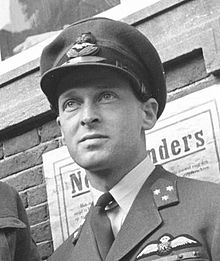Erik Hazelhoff Roelfzema
| Erik Hazelhoff Roelfzema | |
|---|---|

Erik Hazelhoff Roelfzema in 1945
|
|
| Birth name | Erik Hazelhoff Roelfzema |
| Nickname(s) | Soldier of Orange |
| Born |
April 3, 1917 Dutch East Indies |
| Died | September 26, 2007 (aged 90) Island of Hawaii |
| Allegiance | Netherlands |
| Service/branch |
Centrale Inlichtingendienst Dutch resistance Royal Air Force |
| Years of service | 1940–1945 |
| Awards |
Military Order of William War Commemorative Cross Airman's Cross Cross of Merit Resistance Memorial Cross Distinguished Flying Cross 1939-1945 Star Air Crew Europe Star France and Germany Star War Medal 1939-1945 |
Siebren Erik Hazelhoff Roelfzema RMWO, DFC (3 April 1917 – 26 September 2007) was a Dutch writer who became a resistance fighter and RAF pilot during the Second World War. Near the end of the war he was adjudant (assistant) to Queen Wilhelmina. He was made Knight 4th class of the Military William Order.
He is perhaps best known for his book Soldaat van Oranje (Soldier of Orange) which described his experiences in World War II. His book was later made into a film.
Hazelhoff Roelfzema was born in the former Dutch East Indies in Surabaya, on Java, when it was under colonial rule. He was from a patrician family, which is listed in the Nederland's Patriciaat. He was the second child of Siebren Erik Hazelhoff Roelfzema and his wife Cornelia Vreede. His older sister, Ellen, had been born two years before. His father managed rubber and coffee plantations. In the 1930s the family returned to the Netherlands so the children could be provided with a good education. They initially moved to The Hague, and later moved on to Wassenaar. He played soccer and was a member of the Hague Football Association.
Hazelhoff Roelfzema started writing in his teens. From 16 years of age onward he was committed to becoming a writer. He attended the University of Leiden and was a member of the Leidsch Student Corps 'Minerva society' while living at Rapenburg 56. During his hazing initiation the president of his student corps, Ernst de Jonge, threw a soup tureen at a group of new students, striking Hazelhoff Roelfzema in the head and cutting his scalp. De Jonge had been an Olympic rower at the 1936 Summer Olympics in Berlin, and was very popular among the students. His accidental striking of Hazelhoff Roelfzema in the head was the basis for their forming a friendship.
...
Wikipedia
